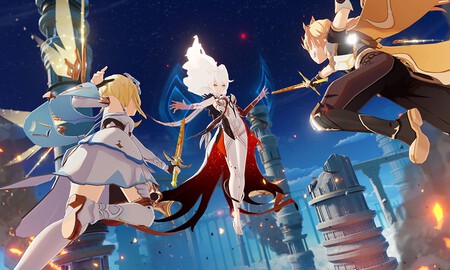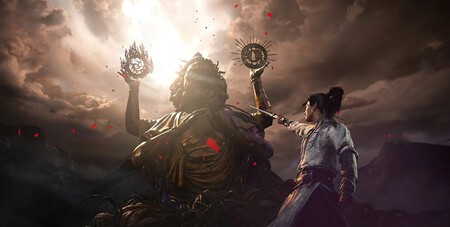Few times have we seen such overwhelming figures like those of Black Myth Wukong. In just three days, Game Science’s first game has managed to sell more than 10 million copies on Steam (the vast majority) and on PlayStation 5. Doing some rough calculations with the number of reviews and simultaneous players on the Steam platform, we can venture that this figure will double in no time and that it is normal that, with a sustained support regime over time (through gradual discounts, expansion of content, and release on additional platforms), the game will become one of the best-selling in history. 30 million? 40 million? It’s hard to say, but everything is possible.
If it were a normal game, I would have no doubt, but it’s a rather peculiar case. 85% of the sales seem to come from China itself, a market that is very complicated to analyze due to the lack of historical references. We are not very clear how it will behave in the long run, but if its trajectory is similar to that of Skyrim, Red Dead Redemption 2, or Elden Ring, the game will end up competing with all of them for the top position in the ranking.
Advertising has been restricted almost entirely to specialized media
Even those of us who were following it since that pre-alpha demo they released in 2020 to recruit developers, the sales figures have surprised us greatly. Beyond being the debut of a studio without recognizable names behind it, the game did not have the support of any of the major global publishers, not even Chinese labels like Tencent or NetEase. Advertising has been restricted almost entirely to specialized media, with no presence in billboards, television, or general newspapers. It has not even had a prominent presence in physical stores, being a completely digital release, also the PS5 version. Nothing seemed to indicate that we were facing a major blockbuster production. It is a success prepared in China and harvested in China, practically turning its back on the global industry. A disruption in every way.

Paradigm Shift
In fifty years of commercial history in video games, the traditional markets have been mainly three. North America (really the United States and Canada), Europe, and Japan. Other territories have been added over the decades, but their importance is still subordinate to the three main ones. If we add up the population of each market, we get the following rough equation: 370 million Americans/Canadians, plus 500 million Europeans, plus 120 million Japanese. In total, 990 million potential customers. The population of China is around 1400 million people. In other words, 40% more than the three main markets combined. These figures are so colossal that they have the ability to distort the very concept of global industry that we had up to this point.
For foreign companies, entering it is almost impossible without the explicit collaboration of a local partner
It’s not that China is an entirely virgin territory, but rather very particular. It is a market heavily controlled by the authorities of the People’s Republic of China in its characteristic fusion of financial capitalism and political communism. For foreign companies, entering it is almost impossible without the explicit collaboration of a local partner. The sale of consoles was banned for more than 15 years (from 2000 to 2015) and the government has no qualms about interfering in censoring content or blocking the operations of certain games. And if not, just ask Blizzard. Their big hits here don’t ring a bell. Titles like Honor of Kings or Fantasy Westward Journey have raised billions of dollars without a strong presence in the West and almost entirely limited to the mobile market.

Genshin Impact was one of the first games of this type to try its luck in the West, with its free-to-play monetization system and a strong presence on mobile in addition to PC and console. It was an almost instant success, leading its company, Mihoyo, to try its luck with similar products but with different settings like Honkai: Star Rail and Zenless Zone Zero. Apart from this, there is a plethora of imitations that follow these titles and they are doing quite well. However, Black Myth Wukong is a completely different beast. A single-player title, without gacha monetization or online elements, focused on powerful computers and last-generation consoles (completely avoiding the mobile phone market), with stunning graphics, with a certain stylization but certainly realistic (no anime cel-shading).

WuKong
Freedom of Expression
One of the most curious things that has happened is how the game has become entangled in the cultural wars in the West almost accidentally. At the end of last year, an investigative report by Rebekah Valentine was published on IGN denouncing sexist attitudes and comments by the studio’s leaders. Beyond the obvious bad taste of some of the expressions, the text tried to focus on the general culture of the technological environment in the Asian country and its supposed hostility towards women and feminist attitudes. A response was quickly formed in Internet circles, and the game was established as an anti-woke standard, creating strange bedfellows: conservative sectors and a more traditional liberalism with netizens, the cyberactivists of the Chinese communist regime. With a scale of values in front of them, these contingents should be opposed, but their rejection of what they perceive as woke imperialism led them to overlook their differences in favor of creating a common front.
It’s so ironic that a cultural product from a country where virtually no freedom of expression exists has been chosen
One of the defense arguments was to respect the freedom of creation and freedom of expression. Allowing developers to make the game they really wanted to make without external interference, referring to alleged attempts at extortion by Western diversity consulting firms, a melon that deserves its own article to explain it properly. No one can deny that it is a hot topic and much more complex than it may seem at first glance. Personally, I consider it fundamental and in case of doubt, it is better to err on the side of excess than of deficiencies. That’s why it’s so ironic that a cultural product from a country where virtually no freedom of expression exists was chosen to establish a line of defense. And not only by the authorities, but also by the members of the community, and if not, just ask the Taiwanese developers of Red Candle Games and the persecution they endured after the release of their horror game Devotion.

The hostile attitude against freedom of expression, unfortunately, also permeates the studio itself. The guidelines that accompanied the codes for influencers are a good example of this. After the usual and reasonable calls for decorum, the text delved into completely unreasonable issues with staggering authoritarianism and with language as broad as it is imprecise. Among the topics to avoid at all costs in live streams were the following: politics (just in general), feminist propaganda, words like “isolation”, “Covid 19” or “quarantine”, as well as any discussion about Chinese video game industry policies, their opinions, or news. It is understandable that the studio wanted to play it safe and sought to isolate itself from the cultural wars in which it had unwittingly become embroiled to generate positive discussion about the game’s merits, but the way it was done only highlighted the cultural abyss between China and the West. And that is something that, beyond each one’s political opinions, should concern us all.
Hiding the PlayStation 5 version from the press is not a good precedent
The entry of such an important player as China into the global ecosystem can be a much-needed adrenaline shot for an industry that seems to have reached its limit. We have opened the tap to a new source of talent capable of conjuring very powerful images and introducing us to narrative traditions as fresh as they are fascinating to Western eyes. Games like Phantom Blade 0 or Where Winds Meet have a lot of potential and together they will foster a much more prone local development environment to take risks with more interesting and nutritious games. But we cannot overlook an uncomfortable reality. Chinese companies conduct themselves in a way that is far from Western customs and practices. If communication is often difficult with Japan, China exhibits a long history that should put us on alert. It is clear that they can do whatever they want and don’t need us, but if they want to sell their products on the world stage, many would appreciate it if they tempered their ways. And I am not simply talking about influencer guidelines.

Hiding the PlayStation 5 version from the press is not a good precedent, just like all the confusion about the reasons for the delay of the Xbox version. If there is indeed a temporary exclusivity contract involved, hinting that everything is due to technical limitations of the console is completely unacceptable. Why not come out and speak clearly and show receipts? Because 75 years of press freedom limitations sweep everything away. The community is usually very critical of Western companies and is always alert to any kind of excesses or abuse of dominant positions. But in China, abuse of dominant position is a way of life from the moment the government exercises it not only with its citizens, but also with international markets, where it uses its enormous weight to impose its criteria in commercial relations. All these issues that concern us right now about digital ownership, the use of licenses, consumer protection, completely abusive terms of service, the treatment of personal data… Each and every one has a more dystopian version in an authoritarian scenario.
In China, abuse of dominant position is a way of life
What we have been able to glimpse at the launch of Black Myth Wukong does not bode well. But these are all rough edges that can be smoothed out. Let’s trust that the next games coming from the People’s Republic will do so and open up to Western ways in these matters. For decades, Western capitalist doctrine argued that if communist markets opened up to the free market, cultural influence would make them more like us. What that doctrine did not take into account is that the channel could also be used in the opposite direction. It is a real possibility that we may end up, surreptitiously, accepting limitations on our freedoms in the name of economic progress. It may be that in the grand scheme of things, a specific video game has little importance. However, a line of defense must be drawn somewhere. What begins with strict guidelines for streamers can degenerate into more dangerous practices. And then we would all lose.
In 3DJuegos | PS5 Pro Announced. Price, specifications, release date, and everything you need to know about the enhanced version of PlayStation 5
In 3DJuegos | The hyper-realistic graphics of Black Myth: Wukong pose a problem that has a difficult solution
In 3DJuegos | China raises its voice against Europe and the United States for a control measure that goes against its technological interests


